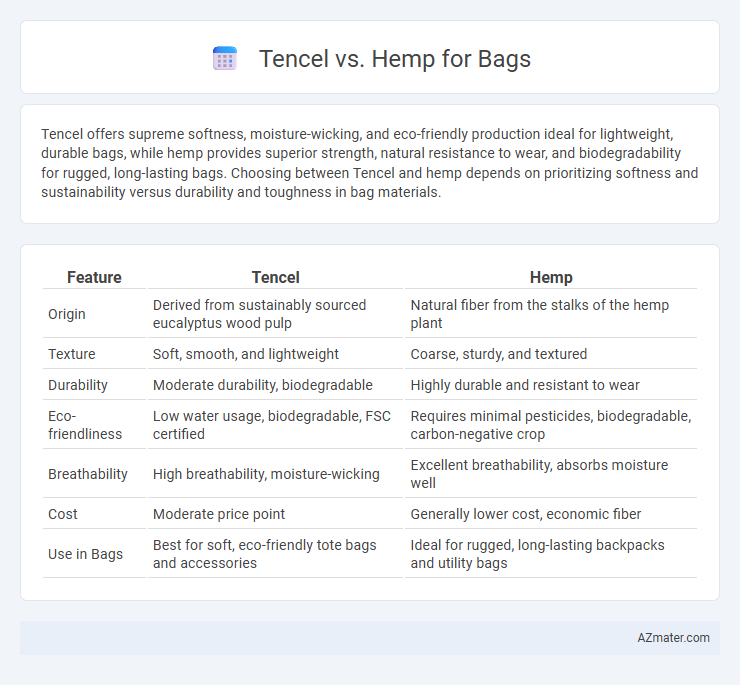Tencel offers supreme softness, moisture-wicking, and eco-friendly production ideal for lightweight, durable bags, while hemp provides superior strength, natural resistance to wear, and biodegradability for rugged, long-lasting bags. Choosing between Tencel and hemp depends on prioritizing softness and sustainability versus durability and toughness in bag materials.
Table of Comparison
| Feature | Tencel | Hemp |
|---|---|---|
| Origin | Derived from sustainably sourced eucalyptus wood pulp | Natural fiber from the stalks of the hemp plant |
| Texture | Soft, smooth, and lightweight | Coarse, sturdy, and textured |
| Durability | Moderate durability, biodegradable | Highly durable and resistant to wear |
| Eco-friendliness | Low water usage, biodegradable, FSC certified | Requires minimal pesticides, biodegradable, carbon-negative crop |
| Breathability | High breathability, moisture-wicking | Excellent breathability, absorbs moisture well |
| Cost | Moderate price point | Generally lower cost, economic fiber |
| Use in Bags | Best for soft, eco-friendly tote bags and accessories | Ideal for rugged, long-lasting backpacks and utility bags |
Introduction to Tencel and Hemp for Bags
Tencel, a sustainable fabric made from wood pulp, is prized for its softness, strength, and eco-friendly production process, making it an ideal material for durable and lightweight bags. Hemp, a natural fiber derived from the Cannabis sativa plant, is known for its exceptional durability, mold resistance, and biodegradability, offering a robust alternative for eco-conscious bag manufacturers. Both materials support sustainable fashion by reducing environmental impact while providing versatile options for stylish and functional bags.
Environmental Impact: Tencel vs Hemp
Tencel, produced from sustainably managed eucalyptus trees, requires less water and produces fewer greenhouse gases compared to conventional textiles, making it a low-impact option for bags. Hemp cultivation benefits from natural pest resistance and minimal need for fertilizers or pesticides, enhancing soil health and reducing agricultural pollution. Both fibers offer eco-friendly alternatives, but hemp's regenerative agricultural benefits typically give it a slight environmental edge over Tencel in bag production.
Durability and Strength Comparison
Tencel and hemp differ significantly in durability and strength for bag materials. Hemp fibers are naturally strong, abrasion-resistant, and heir required for long-lasting bags, making them ideal for heavy-duty use. Tencel, while soft and eco-friendly, offers less tensile strength compared to hemp, making it better suited for lighter, everyday bags.
Softness and Texture of Tencel vs Hemp Bags
Tencel bags offer a remarkably smooth and silky texture, making them exceptionally soft to the touch compared to the coarser and more textured feel of hemp bags. The fine fibers of Tencel create a lightweight, breathable fabric that enhances comfort and flexibility in bag designs. Hemp bags, while durable and eco-friendly, tend to have a rougher surface that emphasizes strength over softness.
Water Resistance and Moisture Management
Tencel fibers exhibit high moisture absorbency and excellent breathability, which enhances moisture management and helps keep bags dry by wicking away sweat efficiently. Hemp fabric offers natural water resistance due to its dense fiber structure, making it more resistant to water penetration and ideal for bags exposed to wet conditions. Combining Tencel's moisture-wicking properties with hemp's water resistance results in durable bags that maintain comfort and protection against moisture.
Weight and Flexibility Differences
Tencel bags are typically lighter than hemp bags due to Tencel's fine, smooth fibers, enhancing portability and ease of carrying. Hemp bags offer greater rigidity and durability but are generally heavier and less flexible, making them sturdy but less pliable for storage. The weight difference results from hemp's denser fiber structure, while Tencel's flexibility provides superior foldability without compromising strength.
Breathability and Comfort in Bag Materials
Tencel fibers offer superior breathability and moisture-wicking properties, making bags comfortable to carry even during extended use. Hemp fabric provides natural ventilation and durability, yet tends to be coarser compared to the smooth texture of Tencel. Breathable Tencel ensures reduced odor and sweat buildup, while hemp's robust structure delivers long-lasting comfort in rugged conditions.
Dyeability and Color Retention
Tencel fibers exhibit excellent dyeability due to their smooth cellulose structure, allowing vibrant, uniform colors that resist fading over time. Hemp, while naturally more coarse, holds dye effectively because of its high absorbency but may experience some color fading with prolonged exposure to sunlight. Both materials offer sustainable options, yet Tencel provides superior color retention and consistency in dyed bags.
Care and Maintenance Requirements
Tencel bags require gentle hand washing with mild detergent and air drying to maintain their smooth texture and prevent fiber damage, while hemp bags are more durable and can withstand machine washing but should be dried naturally to avoid shrinkage. Tencel's moisture-wicking properties demand careful handling to prevent fabric distortion, whereas hemp's natural resistance to mold and UV degradation makes it low-maintenance and ideal for long-term use. Consistent care for both materials ensures longevity but hemp's robust nature offers easier upkeep compared to the delicate nature of Tencel.
Price and Market Availability
Tencel bags generally have a higher price point due to the sustainable production process and brand positioning in the eco-friendly market. Hemp bags offer a more affordable alternative, benefiting from lower raw material costs and widespread cultivation. Market availability favors hemp bags, which are more commonly found in bulk and diverse retail channels compared to the relatively niche presence of Tencel bags.

Infographic: Tencel vs Hemp for Bag
 azmater.com
azmater.com